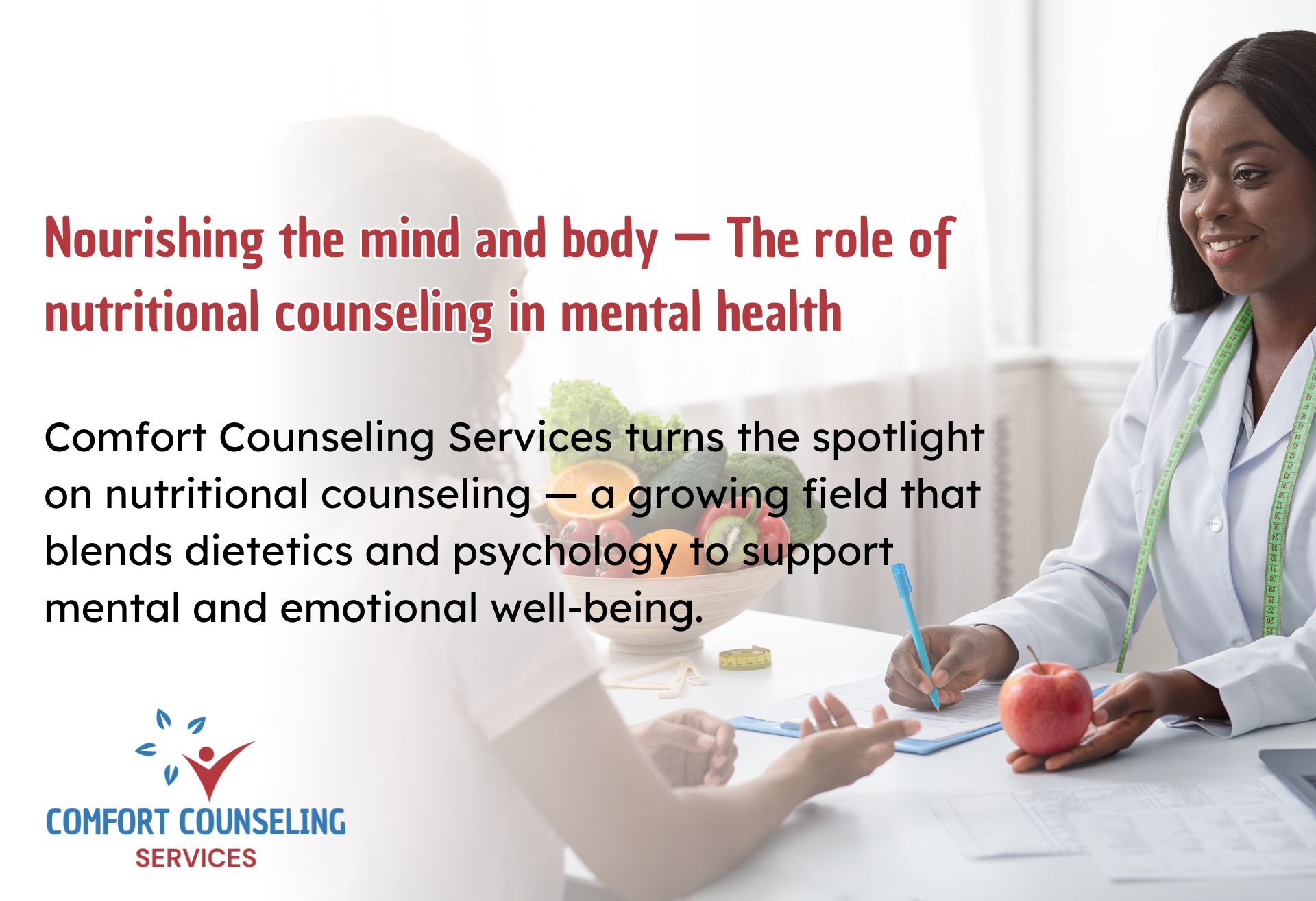In recent years, research has increasingly affirmed what many health professionals have long suspected: what we eat significantly affects how we feel. As we mark mental health awareness month this May, Comfort Counseling Services turns the spotlight on nutritional counseling — a growing field that blends dietetics and psychology to support mental and emotional well-being.
What is nutritional counseling?
Nutritional counseling is a therapeutic approach that helps individuals make informed dietary choices to improve their overall health, including their mental wellness. It involves assessing dietary habits, setting realistic health goals, and developing personalized eating plans that support both physical and psychological well-being (Academy of Nutrition and Dietetics, 2021).
This type of counseling is particularly helpful for individuals struggling with stress, depression, anxiety, eating disorders, and chronic illnesses. By addressing nutritional imbalances and promoting a healthy relationship with food, counselors can empower clients to feel better from the inside out.
The gut-brain connection
One of the most compelling reasons to consider nutritional counseling for mental health is the gut-brain axis — the bidirectional communication between the gastrointestinal tract and the brain. According to Mayer et al. (2015), gut bacteria produce neurotransmitters like serotonin, dopamine, and gamma-aminobutyric acid (GABA), which play key roles in mood regulation.
A poor diet can lead to inflammation and dysbiosis (imbalance of gut bacteria), which has been linked to depression, anxiety, and even cognitive decline (Dinan & Cryan, 2017). Nutritional counseling supports clients in choosing gut-friendly foods, such as high-fiber fruits, vegetables, and fermented foods like yogurt and kefir.
Nutritional deficiencies and mental health
Several nutrients are directly linked to mental health outcomes:
- Omega-3 fatty acids: Essential for brain function and linked to reduced depression and anxiety (Grosso et al., 2014).
- Vitamin D: Low levels are associated with mood disorders, especially seasonal affective disorder (Parker & Brotchie, 2011).
- B vitamins (especially B6, B12, and folate): Crucial for neurotransmitter synthesis and cognitive function (Kennedy, 2016).
- Magnesium and zinc: Often deficient in people with depression and important for mood stabilization (Swardfager et al., 2013).
Through nutritional counseling, clients can identify and correct deficiencies with the help of a licensed nutritionist or in collaboration with a clinical team.
The psychological benefits of nutritional counseling
Besides addressing physiological needs, nutritional counseling offers psychological and behavioural benefits:
-Improved self-esteem and body image – Learning to nourish the body mindfully reduces disordered eating and negative self-perceptions (APA, 2020).
-Greater emotional regulation – Stable blood sugar levels and nutrient-rich meals help manage mood swings and irritability.
-Empowerment and self-efficacy – Setting and achieving small dietary goals boosts confidence and resilience.
Integrating nutritional counseling into holistic mental health care
At Comfort Counseling Services, we believe in a holistic approach to mental health. Nutritional counseling complements traditional talk therapy, psychiatric support and spiritual care by addressing an often-overlooked dimension of wellness: diet and lifestyle.
Our trained counselors and partnered nutritionists work collaboratively to help clients understand the links between food, mood, and behavior. Whether you are managing anxiety, recovering from trauma, or battling fatigue, we can help you develop a nutrition plan that supports your healing journey.
Practical tips for mental wellness through nutrition
Here are some evidence-based tips to support your mental health this month:
- Eat regular, balanced meals with whole grains, lean proteins, and vegetables.
- Include omega-3-rich foods like flaxseeds, salmon, or walnuts.
- Choose complex carbohydrates (e.g., oats, sweet potatoes) to maintain steady energy.
- Limit processed foods, sugar, and caffeine, which can exacerbate mood swings.
- Stay hydrated — even mild dehydration can impact mood and cognition.
- Incorporate mindful eating practices to reconnect with your body’s needs.
When to seek nutritional counseling
If you experience the following symptoms, nutritional counseling may benefit you:
- Persistent low mood or anxiety without a clear cause
- Fatigue despite adequate sleep
- Unhealthy eating patterns or body image issues
- Diagnosed nutrient deficiencies or digestive disorders
- Emotional eating or food-related guilt
Mental health is not just about what’s in your head — it’s also about what’s on your plate!This mental health awareness month, consider how your diet might be affecting your emotions, energy, and outlook. Nutritional counseling offers a valuable path to deeper healing and holistic well-being.
For more information or to schedule a consultation reach out to Comfort Counseling Services today.
References:
Academy of Nutrition and Dietetics. (2021). What is nutritional counseling?
Dinan, T. G., & Cryan, J. F. (2017). The microbiome–gut–brain axis in health and disease. Gastroenterology Clinics of North America, 46(1), 77–89.
Grosso, G. et al. (2014). Role of omega-3 fatty acids in the treatment of depressive disorders: a comprehensive meta-analysis. PLoS One, 9(5), e96905.
Kennedy, D. O. (2016). B vitamins and the brain: mechanisms, dose and efficacy—a review. Nutrients, 8(2), 68.
Mayer, E. A. et al. (2015). Gut/brain axis and the microbiota. The Journal of Clinical Investigation, 125(3), 926–938.
Parker, G., & Brotchie, H. (2011). ‘D’ for depression: any role for vitamin D? Psychotherapy and Psychosomatics, 80(6), 323–325.
Swardfager, W. et al. (2013). Zinc in depression: a meta-analysis. Biological Psychiatry, 74(12), 872–878.
American Psychological Association. (2020). Disordered eating and body image.



